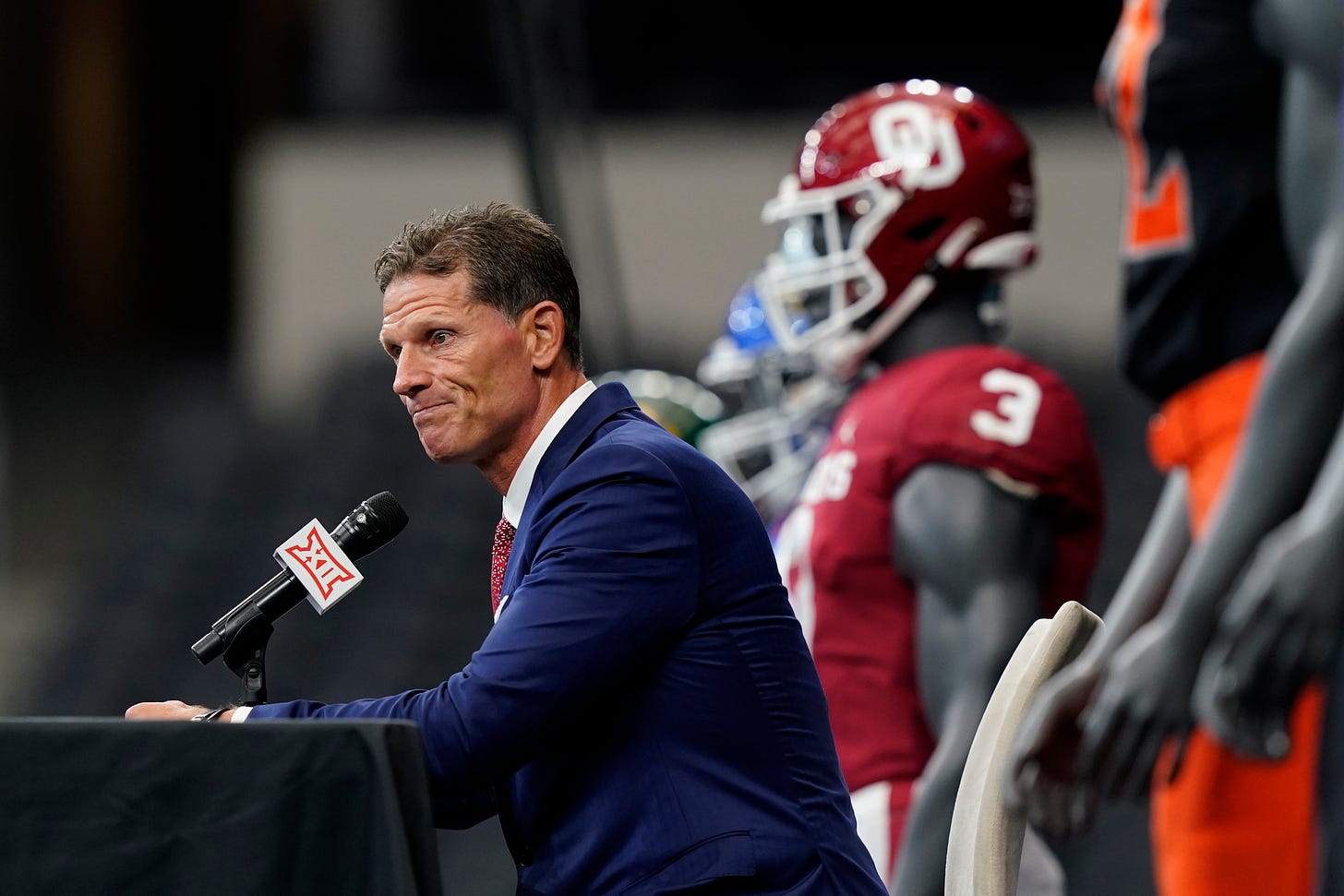Venables becoming program's best rookie coach will be a preposterously tall order
Everybody’s looking forward to Brent Venables’ inaugural season.
If he’s on the sideline, or several steps on the playing field as he’s wont to creep, you can’t miss him, his animated excitement a show of its own.
Because he’s new, small but telling dramas abound, like who starts and who backs up and does he wish to run platoons or find his best 11, 12, 13 or 14 Sooners based upon formation and situation, offensively and defensively, and go long with them, spelling only when required.
What will be the offense’s personality?
Bob Stoops was a defensive coach with great defenses and still, not until Chuck Long became offensive coordinator, Mike Leach and Mark Mangino, and Kevin Wilson after Long, were never not in a hurry to score points.
Will Jeff Lebby’s offense operate similarly unrestrained?
The program already sounds different since Venables’ arrival, but can the culture he’s installing make an immediate dent on the field and where and how big?
It’s fun to ponder.
As is this:
Among rookie Oklahoma football coaches, could Venables deliver a best-ever season or, because they’re two different things, a most-accomplished season.
Uh, no.
Or, let’s say, it’s entirely unlikely because the bar is insanely high.
To know this, a healthy and unbiased memory of about 50 years may be required.
I prefer the “most-accomplished” measure, a judgment that’s going to make some older Sooner fans upset, because the guy who’s rookie season stands alone by that calculus has already been mentioned:
• Bob Stoops
Stoops’ original Sooners went 7-5, but the season remains a thunderclap, a parting of the sea to the promised land.
Sooner Nation presumably enjoyed his 2000 national championship sophomore effort even more, but given the energy of ’99, I’m not sure.
That’s because John Blake’s three seasons in the chair were unthinkably, impossibly and historically horrendous. The ground to be made up was incalculable.
Blake had no idea what he was doing. His assistants became rivals. His press conferences were adventures in non-understanding. His teams were utterly and irrevocably lost.
Then Stoops arrived.
OU beat Indiana State 49-0. Baylor wasn’t any good, but the Bears were a conference team and OU beat them 41-10. Louisville wasn’t ranked but the Cardinals were 2-0, had gone 7-5 the year before and were playing at home and OU beat them 42-21.
Suddenly ranked 23rd, the Sooners fell to Notre Dame despite leading 16-7 and 23-14 in South Bend.
Against Texas, they led the Longhorns 17-3 after a quarter, though Major Applewhite responded like a winner and the Longhorns prevailed 38-28.
But it didn’t matter.
OU was a real team again.
The program was back.
Better things lay head.
So what’s better?
Not losing or putting together an immediate, thought-not-possible-so-soon turnaround delivering more relief than a national championship offers exultation.
Should you prefer the not-losing side, Venables will have a heck of a hard time matching the rookie head coach who pulled that one off:
• Barry Switzer
Switzer’s first band of Sooners didn’t win a national championship, played just 11 games, probation keeping it out of a bowl, and did not win every game it played, tying No. 1 Southern Cal the second week of the season in Los Angeles; one week before beating No. 17 Miami in Norman and two before topping No. 13 Texas in Dallas, and how’s that for a non-conference spread?
Despite what it wasn’t, it was magnificent.
Opening the 1973 season against Baylor, OU entered No. 11. Had Notre Dame just lost once along the way to beating No. 1 Alabama by a point in the Sugar Bowl, the Sooners may well have been crowned national champs, bowl game aside, as they were the next season.
Those Sooners were among the most dominant teams in program history, thrashing the Big Eight, beating Iowa State 34-17 and everybody else — No. 16 Colorado, No. 10 Missouri, No. 18 Kansas, No. 10 Nebraska included — by more.
It was a huge season, but still similar to the previous two.
Switzer had been Chuck Fairbanks’ offensive coordinator before ascending, helping the Sooners to 11-1 seasons in both 1971 and ’72.
Also, it will be exceedingly hard for Venables to top.
The rest, he may eclipse.
Bud Wilkinson took what had been an 8-3 Jim Tatum season and went 7-2-1 in 1947.
Biff Jones, Tatum and Jim Mackenzie deserve some credit.
Mackenzie died of a heart attack at 37 in the fall of 1967 after taking Gomer Jones’ three-win Sooners and winning six in ’66. More importantly, he brought Fairbanks and Switzer on staff.
Tatum’s predecessor, Snorter Luster, won five games in 1942 before Tatum won eight in ’43.
Jones took over for Lew Hardage, winning six in 1935 after Hardage won three in ’34.
Gary Gibbs, 7-4 in 1989, Howard Schnellengerger, 5-5-1 in ’95, and Blake, 3-8 in ’96, Venables should easily surpass.
The lesson?
It’s been a big-time program for a long, long, long time, only a few coaches letting it slip or negligently kicking it off its familiar pedestal.
Venables doesn’t have to be the best at it upon arrival. But putting himself near the top and nowhere near the bottom will be appreciated.


